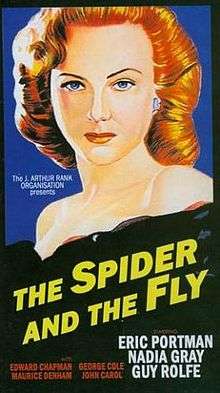The Spider and the Fly (1949 film)
| The Spider and the Fly | |
|---|---|
 | |
| Directed by | Robert Hamer |
| Produced by |
Aubrey Baring Maxwell Setton |
| Written by | Robert Westerby |
| Starring |
Eric Portman Guy Rolfe Nadia Gray |
| Music by | Georges Auric |
| Cinematography | Geoffrey Unsworth |
| Edited by | Seth Holt |
| Distributed by | General Film Distributors |
Release dates | 1949 |
Running time | 92 min. |
| Country | United Kingdom |
| Language | English |
| Budget | £120,000[1] |
The Spider and the Fly is a 1949 film directed by Robert Hamer. An unusual love triangle develops between two criminals and a policeman on the eve of World War I.
Plot
In 1913, Fernand Maubert (Eric Portman), the dedicated chief of police of Paris, is after Philippe Lodocq (Guy Rolfe), a suave bank robber with a series of thefts to his credit, but the criminal always has an alibi. After the latest robbery, Maubert does capture Lodocq's accomplice, Madeleine Saincaise (Nadia Gray).
When she is released from prison, Maubert warns her to stay away from Lodocq (though he has a certain admiration for the man). Impressed by her intelligence, beauty and courage, he begins to court her himself. When Lodocq visits her, she professes her love for him, but he tells her that it is too dangerous to be seen together and that they would eventually tire of each other anyway. Later however, during one of their cordial occasional meetings, Maubert tells Lodocq that he can tell that Madeleine is different from Lodocq's other women; she has gotten under his skin.
Later, the police are tipped off by an informant and arrive during an attempted theft. Lodocq gets away, but his assistant Jean Louis (John Carol) is killed, along with a policeman. Lodocq persuades Madeleine to provide him with an alibi. Maubert knows she is lying, but can do nothing. However, he does stop seeing her.
Finally, Maubert gets the break he has been waiting for. Lodocq employs Jean Louis' brother Alfred for his next theft. Maubert gets Alfred to betray Lodocq, not out of revenge, but by telling him that Lodocq did not give his mother Jean's fair share of the loot (a lie). Lodocq is imprisoned just as World War I breaks out.
In the war, Maubert becomes a major in French counterintelligence. When the Minister of War (Edward Chapman) tells him that they urgently need a list of German spies in France being kept in a safe in the German embassy in neutral Berne, Switzerland, Maubert states there is only one man for the job. Maubert is authorized to offer a pardon to Lodocq in exchange for his services. The prisoner agrees after Maubert dangles the prospect of seeing Madeleine.
The theft goes off without a hitch. However, when Lodocq goes to Madeleine's flat, he finds a despondent Maubert already there. In a surprise twist, it turns out that Madeleine's name was on the list they stole. She is taken away, with the implication that she will be executed for treason. In the final scene, Maubert watches Lodocq, now an anonymous French soldier, board a train for the intense fighting at Verdun, both knowing that Lodocq stands little chance of survival.
Cast
- Eric Portman as Fernand Maubert
- Guy Rolfe as Philippe Lodocq
- Nadia Gray as Madeleine Saincaize
- George Cole as Marc, Maubert's assistant
- John Carol as brothers Jean and Alfred Louis
- Harold Lang as Belfort, an informant
- Edward Chapman as Minister for War
- Maurice Denham as Colonel de la Roche, the minister's aide
- John Salew as Minister's Secretary
- May Hallatt as Monique
- James Hayter as Mayor
- Arthur Lowe as Town Clerk
- Patrick Young as Captain le Maitre
- Sebastian Cabot as Prefect at Amiens
- Keith Pyott as Father Pletsier
- Philip Stainton as Cafe owner
- Hal Osmond as Swiss Taxi Driver
References
- ↑ "THE STARRY WAY". The Courier-mail (4075). Queensland, Australia. 17 December 1949. p. 2. Retrieved 24 May 2016 – via National Library of Australia.